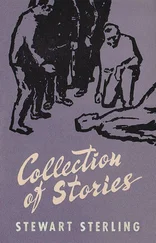“I’ll make it, I’ll make it,” he said. “It’ll be on his desk waiting for him at eight thirty on the dot.”
“Oh, and I have good news for you. He’s not only giving you Bill Hammond’s rate on this one — two cents a word — but he told me to tell you that if you do a good job, he’ll see to it that you get that extra additional bonus over and above the word count itself that you were hinting about when he first called you today.”
“Swell!” he exclaimed gratefully.
A note of maternal instruction crept into her voice. “Now get down to work and show him what you can do. He really thinks a lot of you, Dan. I’m not supposed to say this. And try to have it down here before he comes in tomorrow. I hate to see him worry so. When he worries, I’m miserable along with him. Good luck.” And she hung up.
Joe came back with the beer, six bottles in each of two paper sacks.
“Put them on the floor alongside the table, where I can just reach down,” instructed Moody.
“He bawled the heck out of me downstairs, but I don’t care, it was worth it. Here’s a bottle opener the delicatessen people gave me.”
“That about kills what I gave you.” Moody calculated, fishing into his pocket. “Here’s—”
“No,” protested Joe sincerely, with a dissuading gesture. “I don’t want to take any tip from you , Mr. Moody. You’re different from other people that come in here. You’re a Writer, and I always wanted to be a writer myself. But if I could ever get to read a story of yours—” he added wistfully.
Moody promptly rummaged in the remnants of the brown paper, came up with a magazine which had been entombed there. “Here — here’s last month’s,” he said. “I was taking it home with me, but I can get another at the office.”
Its title was Startling Stories! — complete with exclamation point. Joe wiped his fingertips reverently against his uniform before touching it, as though afraid of defiling it.
Moody opened it for him, offered it to him that way. “Here I am, here,” he said. “Second story. Next month I’m going to be the lead story, going to open the book on account of doing the cover story.” He harked back to his humble beginnings for an indulgent moment. “When I first began, I used to be all the way in the back of the book. You know, where the muscle-building ads are.”
“‘Killing Time, by Dan Moody,’” Joe mouthed softly, like someone pronouncing a litany.
“They always change your titles on them, I don’t know why,” Moody complained fretfully. “My own title for that one was ‘Out of the Mouths of Guns.’ Don’t you think that’s better?”
“Wouldje—?” Joe was fumbling with a pencil, half afraid to offer it.
Moody took the pencil from Joe’s fingers, wrote on the margin alongside the story title: “The best of luck to you, Joe — Dan Moody,” Joe the while supporting the magazine from underneath with the flaps of both hands, like an acolyte making an offering at some altar.
“Gee,” Joe breathed, “I’m going to keep this forever. I’m going to paste transparent paper over it, so it won’t get rubbed off, where you wrote.”
“I would have done it in ink for you,” Moody said benevolently, “only the pulp paper won’t take it — it soaks it up like a blotter.”
The phone gave another of its irritable, foreshortened blats.
Joe jumped guiltily, hastily backed toward the door. “I better get back on duty, or he’ll be raising cain down there.” He half closed the door, reopened it to add, “If there’s anything you want, Mr. Moody, just call down for me. I’ll drop anything I’m doing and beat it right up here.”
“Thanks, I will, Joe,” Moody promised, with the warm, comfortable smile of someone whose ego has just been talcumed and cuddled in cotton-wool.
“And good luck to you on the story. I’ll be rooting for you!”
“Thanks again, Joe.”
Joe closed the door deferentially, holding the knob to the end, so that it should make a minimum of noise and not disturb the mystic creative process about to begin inside.
Before it did, however, Moody went to the phone and asked for a nearby Long Island number. A soprano that sounded like a schoolgirl’s got on.
“It’s me, honeybunch,” Moody said.
The voice had been breathless already, so it couldn’t get any more breathless; what it did do was not get any less breathless. “What happened? Ooh, hurry up, tell me! I can’t wait. Did you get the assignment on the cover story?”
“Yes, I got it! I’m in the hotel room right now, and they’re paying all the charges. And listen to this: I’m getting double word-rate, two cents—”
A squeal of sheer joy answered him.
“And wait a minute, you didn’t let me finish. If he likes the job, I’m even getting an extra additional bonus on top of all that. Now what do you have to say to that?”
The squeals became multiple this time — a series of them instead of just one. When they subsided, he heard her almost gasp: “Oh, I’m so proud of you!”
“Is Sonny-bun awake yet?”
“Yes. I knew you’d want to say good night to him, so I kept him up. Wait a minute, I’ll go and get him.”
The voice faded, then came back again. However, it seemed to be as unaccompanied as before. “Say something to Daddy. Daddy’s right here. Daddy wants to hear you say something to him.”
Silence.
“Hello, Sonny-bun. How’s my little Snooky?” Moody coaxed.
More silence.
The soprano almost sang, “Daddy’s going to do a big important job. Aren’t you going to wish him luck?”
There was a suspenseful pause, then a startled cluck like that of a little barnyard fowl, “Lock!”
The squeals of delight this time came from both ends of the line, and in both timbres, soprano and tenor. “He wished me luck! Did you hear that? He wished me luck! That’s a good omen. Now it’s bound to be a lulu of a story!”
The soprano voice was too taken up distributing smothered kisses over what seemed to be a considerable surface-area to be able to answer.
“Well,” he said, “guess I better get down to business. I’ll be home before noon — I’ll take the ten forty-five, after I turn the story in at Tartell’s office.”
The parting became breathless, flurried, and tripartite.
“Do a bang-up job now”/“I’ll make it a smasheroo”/“Remember, Sonny-bun and I are rooting for you”/“Miss me”! “And you miss us, too”/” Smack, smack “/” Smack, smack, smack “/” Gluck!
He hung up smiling, sighed deeply to express his utter satisfaction with his domestic lot. Then he turned away, lathered his hands briskly, and rolled up his shirt sleeves.
The preliminaries were out of the way, the creative process was about to begin. The creative process, that mystic life force, that splurge out of which has come the Venus de Milo, the Mona Lisa, the Fantasie Impromptu, the Bayeux tapestries, Romeo and Juliet, the windows of Chartres Cathedral, Paradise Lost — and a pulp murder story by Dan Moody. The process is the same in all; if the results are a little uneven, that doesn’t invalidate the basic similarity of origin.
He sat down before Gertie and, noting that the oval of light from the lamp fell on the machine, to the neglect of the polychrome cardboard mat which slanted in comparative shade against the wall, he adjusted the pliable lamp-socket so that the luminous egg was cast almost completely on the drawing instead, with the typewriter now in the shadow. Actually he didn’t need the light on his typewriter. He never looked at the keys when he wrote, nor at the sheet of paper in the machine. He was an expert typist, and if in the hectic pace of his fingering he sometimes struck the wrong letter, they took care of that down at the office, Tartell had special proofreaders for that. That wasn’t Moody’s job — he was the creator, he couldn’t be bothered with picayune details like a few typographic errors. By the same token, he never went back over what he had written to reread it; he couldn’t afford to, not at one cent a word (his regular rate) and at the pressure under which he worked. Besides, it was his experience that it always came out best the first time; if you went back and reread and fiddled around with it, you only spoiled it.
Читать дальше












